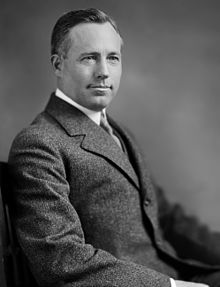Jesse B. Jackson
| Jesse B. Jackson | |
|---|---|
 |
|
| Born |
November 19, 1871 Paulding, Ohio |
| Died | December 4, 1947 (aged 76) Columbus, Ohio |
| Nationality | American |
| Occupation | United States Consul |
| Known for | Witness to the Armenian Genocide |
Jesse Benjamin Jackson (November 19, 1871 – December 4, 1947) was a United States consul and an important eyewitness to the Armenian Genocide. He served as consul in Aleppo when the city was the junction of many important deportation routes. Jackson concluded that the policies towards the Armenians were "without doubt a carefully planned scheme to thoroughly extinguish the Armenian race." He considered the "wartime anti-Armenian measures" to be a "gigantic plundering scheme as well as a final blow to extinguish the race." By September 15, 1915, Jackson estimated that a million Armenians had been killed and deemed his own survival a "miracle". After the Armenian Genocide, Jackson led a relief effort and was credited with saving the lives of "thousands of Armenians."
After serving as consul in Aleppo, Jackson served in Italy and Canada. He was awarded numerous medals, including the Order of Merit of Lebanon. He died on December 4, 1947, at the age of 76.
Jesse Benjamin Jackson was born in Paulding, Ohio, on November 19, 1871, to Andrew Carl Jackson and Lucy Ann (Brown) Jackson. Jackson attended the local Paulding public schools and eventually served as a quartermaster sergeant in the U.S. Army during the Spanish–American War. Jackson enrolled as a clerk of the House of Representatives from 1900–01 and later was employed in the insurance and real estate business. Jackson was later appointed as the American consul at İskenderun on March 15, 1905. This position lasted until 1908 when he became the U.S. consul at Aleppo.
As early as November 19, 1912, after four years as consul in Aleppo, Jackson had his staff raise concerns with the foreign embassies in Constantinople that the Turkish government was determined to place the Vilayet of Aleppo under martial law, warning that Muslims, who had abandoned their duties from the army, were engaged in "depredations" in the province, which the Turkish authorities accused the Armenians of carrying out, so that the latter "shall be at the mercy of the Moslems." Jackson requested that the embassies raise the issue with the Ottoman government, so as to prevent massacres against the Armenians “which, under the present strained conditions, would spread like wildfire, and likely engulf Christians of all denominations far and wide.”
...
Wikipedia
